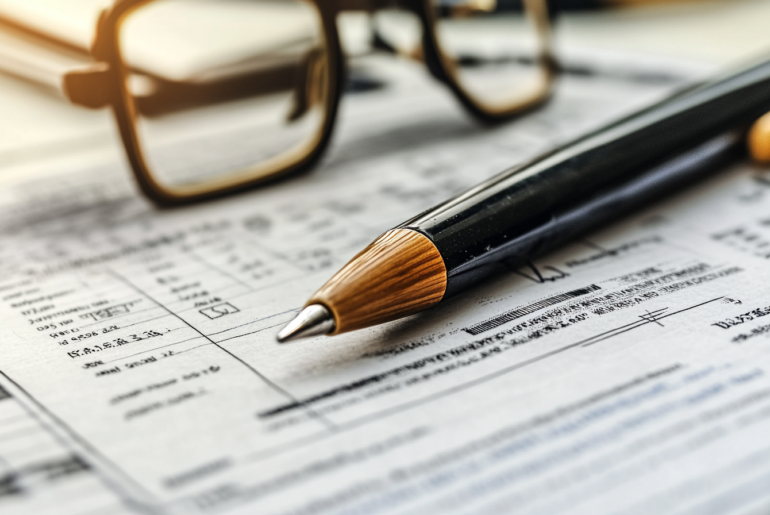This article may contain references to products or services from one or more of our advertisers or partners. We may receive compensation when you click on links to those products or services. Nonetheless, our opinions are our own.
- Key Highlights
- Introduction
- Understanding Bank Statement Loans in 2025
- The Growth of Bank Statement Loans for Self-Employed Borrowers
- Conclusion
- Frequently Asked Questions
- Recommended Reads
Key Highlights
- Bank statement loans help self-employed people get money even if they do not meet the rules for regular mortgages.
- These loans use bank statements to show income. Borrowers do not have to give tax returns or pay stubs.
- Self-employed people, freelancers, and business owners with changing incomes can benefit from bank statement loans.
- Lenders check if you can qualify by looking at bank statement deposits, credit scores, and other financial information.
- It is important to know the requirements, benefits, and drawbacks of bank statement loans to make good choices.
Introduction
For self-employed borrowers, the mortgage process can be challenging. A major issue they face is proving their income. In 2025, bank statement loans will offer a simple solution. These loans allow self-employed individuals to obtain a home loan by using their bank statements rather than tax returns. This helps those with fluctuating income make homeownership easier.
Understanding Bank Statement Loans in 2025
For people who are self-employed, getting a mortgage can be difficult. This is because there are strict rules on proving how much money they make. Regular lenders often look at tax returns, pay stubs, and credit scores to decide if you qualify for a loan. But, these documents may not show the real income for people who make money in different ways.
Bank statement loans fix this issue by relying on bank deposits instead of tax documents. Lenders check bank statements to see the borrower’s average monthly income. They want to know if the borrower can afford mortgage payments. This approach is useful for people whose tax returns do not reflect all their earnings.
The Growth of Bank Statement Loans for Self-Employed Borrowers
Mortgage lending has improved to support more self-employed individuals. Traditional mortgage options often overlook the fluctuating income of business owners, freelancers, and entrepreneurs. For this reason, bank statement loans are now becoming more popular.
These loans support people who want to buy homes or investment properties. Lenders check bank statements instead of tax returns. This helps them understand a borrower’s financial situation more clearly. This way is especially good for those whose income varies often.
Bank statement loans are not the same as traditional loans. For traditional loans, you usually need a steady job and good credit. Lenders check your income and credit score closely. They often ask for tax forms and several pay stubs.
In contrast, bank statement loans look at your bank statements instead of standard paperwork. This type of loan is helpful for people who are self-employed or have income that varies. Lenders mainly review your monthly deposits from several months. They do this to find out how much money you really earn.
To sum it up, bank statement loans use bank records to check your income. Traditional loans focus more on credit scores and job history. This makes bank statement loans a great choice for many people.
Bank statement loans are not like regular mortgages in several key ways.
- Income Check: Regular loans need W-2 forms, tax papers, and pay stubs. Bank statement loans use your business or personal bank statements instead.
- Credit Score Needs: Both loan types usually require a minimum credit score of 620. Yet, bank statement loans may be more flexible.
- Approval Steps: Regular loans focus on tax papers a lot. Bank statement loans look at the real cash flow, showing a clearer view of a borrower’s money health.
- Down Payments & Interest Rates: Bank statement loans may have higher interest rates or down payment requirements based on the lender and type of mortgage.
Bank statements are vital for mortgage applications, especially for self-employed individuals. They help lenders understand your earnings and spending behavior. This insight shows whether you can manage your payments. A strong bank statement includes regular deposits and few large expenses. Lenders want to feel safe when giving you money. Therefore, keep your bank statements tidy and current to assist your loan application.
For self-employed people, bank statements are a key way to show income. Lenders look at these statements to see cash flow. This helps ensure the borrower can pay the mortgage. When tax returns do not show a borrower’s total earnings, bank statements provide a better way to confirm their income.
Lenders check a person’s money history to decide how much to loan and the terms. This simple process is helpful for both borrowers and lenders. It ensures fair choices about what someone can afford.
Analyzing Bank Statement Requirements in 2025
Lenders look closely at bank statements when they review loan applications. Borrowers typically need to provide statements from the last 12 to 24 months. This allows lenders to check if the income is stable and to understand the financial situation.
Lenders look at statements to find the average monthly income. They examine different sources, such as money from a business and investments. This process helps them understand if a borrower can manage mortgage payments along with their regular bills.
Starting with Bank Statement Loans: What You Need
Before applying for a bank statement loan, borrowers must gather important documents. Since checking income is important for these loans, it is necessary to have clear and organized bank statements.
- Get at least 12 months of bank statements (some lenders want 24 months).
- Keep a good credit score to get better loan deals.
- Make sure you have enough for a down payment and think about the closing costs.
- Get your money records ready, like profit and loss statements, to show you can handle money well.
Evaluating If You Meet the Requirements as a Self-Employed Applicant
Self-employed people should look at their money situation before applying. Key things lenders consider are:
- Credit history: A good credit score with few missed payments helps you get approved for a loan.
- Debt-to-Income Ratio (DTI): Keeping your DTI under 43% will help with getting approved.
- Consistent cash flow: Lenders check bank deposits to see if your money is stable.
Speaking with a loan officer who understands bank statement loans can provide you with useful advice for your situation.
Get a Bank Statement Loan: A Simple Guide
Step 1: Gathering Your Bank Statements
Start by getting bank statements from the last year. Make sure they are clear and full to prevent any delays in getting the go-ahead. Sorting the statements by date helps lenders look at your money history more easily.
Step 2: Choosing the Right Lender
Not every lender has bank statement loans. So, it’s important for you to research. Check interest rates, loan terms, and fees. This will help you find a lender that offers these loan types. When you negotiate better terms, you can save money in the long run.
Step 3: Understanding the Application Process
Most lenders allow you to apply online. This makes the process easier. When you apply, you must provide details about your income, what you own, your debts, and your job history. It is very important to be clear to avoid any issues.
Step 4: Completing the Loan Application
Make sure to be correct when you send money papers. Lenders might ask for more records, like tax returns and papers about your money. Showing you have saved money for down payments shows you are prepared for money matters.
Step 5: Knowing the Approval and Closing Process
After you submit the application, the lender reviews your financial history and credit score. Answering their questions quickly can help speed up the approval process. Once you are approved, you will receive a loan estimate. This document shows you the terms and conditions before you proceed to closing.
| Feature | Bank Statement Loan | Traditional Mortgage |
|---|---|---|
| Income Verification | Bank Statements (12-24 Months) | Pay Stubs, W-2s, Tax Returns |
| Borrower Type | Self-Employed, Fluctuating Income | Salaried Employees, Stable Income |
| Down Payment | Typically Higher (10% or more) | May be lower (3% to 20%) |
| Interest Rates | Generally Higher | Potentially Lower |
Pros and Cons of Bank Statement Loans
Pros
- Simple income checks for self-employed people.
- Loans available for those with fluctuating income.
- Bigger loan amounts than some regular loans.
Cons
- Interest rates are higher than regular mortgages.
- You need a larger down payment (starting at 10%).
- There are tougher rules for credit scores to get good terms.
Conclusion
Bank statement loans are a good choice for self-employed people in 2025. These loans use bank statements instead of tax returns. This process helps those with uneven income. It’s important to understand the application steps, eligibility, and benefits to make the best choices. By having the right documents and picking the right lender, self-employed people can get home loans more easily.
Frequently Asked Questions
What are the main benefits of a bank statement loan for self-employed individuals?
Bank statement loans help self-employed people get approved for mortgages more easily. Lenders don’t depend only on tax returns. This allows borrowers with changing or non-standard income to qualify. This way works well for those with high business expenses or deductions that may show a lower gross income. It makes owning a home more possible.
How many months of bank statements are typically required in 2025?
Many lenders that provide bank statement loans in 2025 ask for at least 12 months of consecutive bank statements. Some lenders may want as many as 24 months, particularly if the borrowers have more complicated financial situations.
Can I qualify for a bank statement loan with irregular income?
Bank statement loan programs help people who have uneven income, like freelancers, independent contractors, and seasonal business owners. These loans look at the total cash flow in the borrower’s business accounts. This helps to decide if they can pay back the mortgage.

Reviewed and edited by Albert Fang.
See a typo or want to suggest an edit/revision to the content? Use the contact us form to provide feedback.
At FangWallet, we value editorial integrity and open collaboration in curating quality content for readers to enjoy. Much appreciated for the assist.
Did you like our article and find it insightful? We encourage sharing the article link with family and friends to benefit as well - better yet, sharing on social media. Thank you for the support! 🍉
Article Title: What is a Bank Statement Loan? Here’s How It Works for Self-Employed Borrowers in 2025
https://fangwallet.com/2025/03/13/bank-statement-loan/The FangWallet Promise
FangWallet is an editorially independent resource - founded on breaking down challenging financial concepts for anyone to understand since 2014. While we adhere to editorial integrity, note that this post may contain references to products from our partners.
The FangWallet promise is always to have your best interest in mind and be transparent and honest about the financial picture.
Become an Insider

Subscribe to get a free daily budget planner printable to help get your money on track!
Make passive money the right way. No spam.
Editorial Disclaimer: The editorial content on this page is not provided by any of the companies mentioned. The opinions expressed here are the author's alone.
The content of this website is for informational purposes only and does not represent investment advice, or an offer or solicitation to buy or sell any security, investment, or product. Investors are encouraged to do their own due diligence, and, if necessary, consult professional advising before making any investment decisions. Investing involves a high degree of risk, and financial losses may occur including the potential loss of principal.
Source Citation References:
+ Inspo
There are no additional citations or references to note for this article at this time.












































